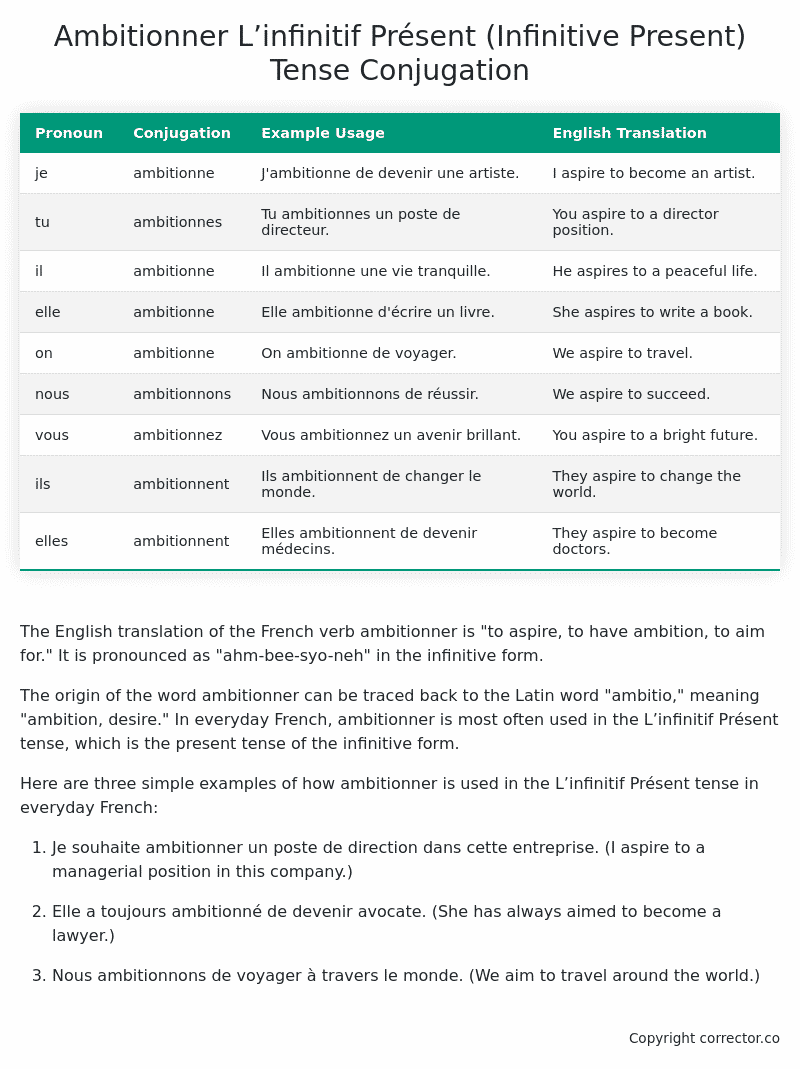L’infinitif Présent (Infinitive Present) Tense Conjugation of the French Verb ambitionner
Introduction to the verb ambitionner
The English translation of the French verb ambitionner is “to aspire, to have ambition, to aim for.” It is pronounced as “ahm-bee-syo-neh” in the infinitive form.
The origin of the word ambitionner can be traced back to the Latin word “ambitio,” meaning “ambition, desire.” In everyday French, ambitionner is most often used in the L’infinitif Présent tense, which is the present tense of the infinitive form.
Here are three simple examples of how ambitionner is used in the L’infinitif Présent tense in everyday French:
-
Je souhaite ambitionner un poste de direction dans cette entreprise. (I aspire to a managerial position in this company.)
-
Elle a toujours ambitionné de devenir avocate. (She has always aimed to become a lawyer.)
-
Nous ambitionnons de voyager à travers le monde. (We aim to travel around the world.)
Table of the L’infinitif Présent (Infinitive Present) Tense Conjugation of ambitionner
| Pronoun | Conjugation | Example Usage | English Translation |
|---|---|---|---|
| je | ambitionne | J’ambitionne de devenir une artiste. | I aspire to become an artist. |
| tu | ambitionnes | Tu ambitionnes un poste de directeur. | You aspire to a director position. |
| il | ambitionne | Il ambitionne une vie tranquille. | He aspires to a peaceful life. |
| elle | ambitionne | Elle ambitionne d’écrire un livre. | She aspires to write a book. |
| on | ambitionne | On ambitionne de voyager. | We aspire to travel. |
| nous | ambitionnons | Nous ambitionnons de réussir. | We aspire to succeed. |
| vous | ambitionnez | Vous ambitionnez un avenir brillant. | You aspire to a bright future. |
| ils | ambitionnent | Ils ambitionnent de changer le monde. | They aspire to change the world. |
| elles | ambitionnent | Elles ambitionnent de devenir médecins. | They aspire to become doctors. |
Other Conjugations for Ambitionner.
Le Present (Present Tense) Conjugation of the French Verb ambitionner
Imparfait (Imperfect) Tense Conjugation of the French Verb ambitionner
Passé Simple (Simple Past) Tense Conjugation of the French Verb ambitionner
Passé Composé (Present Perfect) Tense Conjugation of the French Verb ambitionner
Futur Simple (Simple Future) Tense Conjugation of the French Verb ambitionner
Futur Proche (Near Future) Tense Conjugation of the French Verb ambitionner
Plus-que-parfait (Pluperfect) Tense Conjugation of the French Verb ambitionner
Passé Antérieur (Past Anterior) Tense Conjugation of the French Verb ambitionner
Futur Antérieur (Future Anterior) Tense Conjugation of the French Verb ambitionner
Subjonctif Présent (Subjunctive Present) Tense Conjugation of the French Verb ambitionner
Subjonctif Passé (Subjunctive Past) Tense Conjugation of the French Verb ambitionner
Subjonctif Imparfait (Subjunctive Imperfect) Tense Conjugation of the French Verb ambitionner
Conditionnel Présent (Conditional Present) Tense Conjugation of the French Verb ambitionner
Conditionnel Passé (Conditional Past) Tense Conjugation of the French Verb ambitionner
L’impératif Présent (Imperative Present) Tense Conjugation of the French Verb ambitionner
L’infinitif Présent (Infinitive Present) Tense Conjugation of the French Verb ambitionner (this article)
Struggling with French verbs or the language in general? Why not use our free French Grammar Checker – no registration required!
Get a FREE Download Study Sheet of this Conjugation 🔥
Simply right click the image below, click “save image” and get your free reference for the ambitionner L’infinitif Présent tense conjugation!

Ambitionner – About the French L’infinitif Présent (Infinitive Present) Tense
Forming the Infinitive Present
Common Everyday Usage Patterns
As a Verb’s Dictionary Form
After Modal Verbs
As an Imperative
In Infinitive Clauses
Interactions with Other Tenses
Present Tense
Future Tense
Conditional Tense
Passé Composé
Imperfect Tense
Subjunctive and Conditional Moods
Summary
Want More?
I hope you enjoyed this article on the verb ambitionner. Still in a learning mood? Check out another TOTALLY random French verb conjugation!


